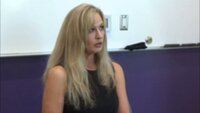| Title |
Darrington, Debra OH19_071 |
| Creator |
Weber State University, Stewart Library: Oral History Program. |
| Contributors |
Darrington, Debra, Interviewee; Karras, Micol, Interviewer; Tooker, Sarah, Video Technician |
| Description |
The Beyond Suffrage Project was initiated to examine the impact women have had on northern Utah. Weber State University explored and documented women past and present who have influenced the history of the community, the development of education, and are bringing the area forward for the next generation. The project looked at how the 19th Amendment gave women a voice and representation, and was the catalyst for the way women became involved in the progress of the local area. The project examines the 50 years (1870-1920) before the amendment, the decades to follow and how women are making history today. |
| Abstract |
The following is an oral history interview with Debra Darrington, conducted on June 14, 2019, in the Stewart Library, by Micol Karras. In this interview, Debra discusses her life, her memories, and the impact of the 19th Amendment. Sarah Tooker, the video technician, is also present during this interview.; The following is a video clip of an oral history interview with Debra Darrington, conducted on June 14, 2019. In this video clip, Debra discusses how she empowers herself and other women. |
| Image Captions |
Debra Darrington Circa 2019; Debra Darrington discussing how she empowers herself and other women. |
| Subject |
Weber State University; Universities and colleges; Female Business Owner; Education, Higher; Entrepreneurship; Inspirational Speaker; Rape; Domestic Abuse; Voter Rights |
| Keywords |
19th Amendment; Voter rights; Gender equality |
| Digital Publisher |
Stewart Library, Weber State University, Ogden, Utah, United States of America |
| Date |
2019 |
| Date Digital |
2019 |
| Temporal Coverage |
1965; 1966; 1967; 1968; 1969; 1970; 1971; 1972; 1973; 1974; 1975; 1976; 1977; 1978; 1979; 1980; 1981; 1982; 1983; 1984; 1985; 1986; 1987; 1988; 1989; 1990; 1991; 1992; 1993; 1994; 1995; 1996; 1997; 1998; 1999; 2000; 2001; 2002; 2003; 2004; 2005; 2006; 2007; 2008; 2009; 2010; 2011; 2012; 2013; 2014; 2015; 2016; 2017; 2018; 2019 |
| Medium |
oral histories (literary genre) |
| Spatial Coverage |
Ogden, Weber County, Utah, United States, http://sws.geonames.org/11788968, 41.22809, -111.96766; Brigham City, Box Elder, Utah, United States, http://sws.geonames.org/5771960, 41.51021, -112.0155; Clearfield, Davis, Utah, United States, http://sws.geonames.org/5772959, 41.11078, -112.02605; Syracuse, Davis, Utah, United States, http;//sws.geonames.org/5782391, 41.08939, -112.06467; Layton, Davis, Utah, United States, http://sws.geonames.org/5777107, 41.06022, -111.97105 |
| Type |
Text; Image/StillImage; Image/MovingImage |
| Access Extent |
56 page PDF; Video clip is an mp4 file, 62.4 MB |
| Conversion Specifications |
Filmed using a Sony HDR-CX430V digital video camera. Sound was recorded with a Sony ECM-AW3(T) bluetooth microphone. Transcribed using Express Scribe Transcription Software Pro 6.10 Copyright NCH Software. |
| Language |
eng |
| Rights |
Materials may be used for non-profit and educational purposes, please credit University Archives; Weber State University; Music from Uppbeat (free for Creators!): https://uppbeat.io/t/yeti-music/gentle-breeze; License code: IWGKRYG7XHQOMZY0; Music from Uppbeat (free for Creators!): https://uppbeat.io/t/simon-folwar/hope; License code: KYI5VLB63GF1TXND |
| Source |
Darrington, Debra OH19_071 Weber State University Archives |
| Format |
application/pdf; video/mp4 |
| ARK |
ark:/87278/s63fhecj |
| Setname |
wsu_bs_oh |
| ID |
105479 |
| Reference URL |
https://digital.weber.edu/ark:/87278/s63fhecj |
| Title |
Darrington, Debra OH19_071 |
| Creator |
Weber State University, Stewart Library: Oral History Program. |
| Contributors |
Darrington, Debra, Interviewee; Karras, Micol, Interviewer; Tooker, Sarah, Video Technician |
| Description |
The Beyond Suffrage Project was initiated to examine the impact women have had on northern Utah. Weber State University explored and documented women past and present who have influenced the history of the community, the development of education, and are bringing the area forward for the next generation. The project looked at how the 19th Amendment gave women a voice and representation, and was the catalyst for the way women became involved in the progress of the local area. The project examines the 50 years (1870-1920) before the amendment, the decades to follow and how women are making history today. |
| Abstract |
The following is an oral history interview with Debra Darrington, conducted on June 14, 2019, in the Stewart Library, by Micol Karras. In this interview, Debra discusses her life, her memories, and the impact of the 19th Amendment. Sarah Tooker, the video technician, is also present during this interview. |
| Image Captions |
Debra Darrington Circa 2019 |
| Subject |
Weber State University; Universities and colleges; Female Business Owner; Higher Education; Entrepreneurship; Inspirational Speaker; Rape; Domestic Abuse; Voter Rights |
| Keywords |
19th Amendment; Voter rights; Gender equality |
| Digital Publisher |
Stewart Library, Weber State University, Ogden, Utah, United States of America |
| Date Digital |
2019 |
| Temporal Coverage |
1965; 1966; 1967; 1968; 1969; 1970; 1971; 1972; 1973; 1974; 1975; 1976; 1977; 1978; 1979; 1980; 1981; 1982; 1983; 1984; 1985; 1986; 1987; 1988; 1989; 1990; 1991; 1992; 1993; 1994; 1995; 1996; 1997; 1998; 1999; 2000; 2001; 2002; 2003; 2004; 2005; 2006; 2007; 2008; 2009; 2010; 2011; 2012; 2013; 2014; 2015; 2016; 2017; 2018; 2019 |
| Medium |
oral histories (literary genre) |
| Spatial Coverage |
Ogden, Weber County, Utah, United States, http://sws.geonames.org/11788968, 41.22809, -111.96766; Brigham City, Box Elder, Utah, United States, http://sws.geonames.org/5771960, 41.51021, -112.0155; Clearfield, Davis, Utah, United States, http://sws.geonames.org/5772959, 41.11078, -112.02605; Syracuse, Davis, Utah, United States, http;//sws.geonames.org/5782391, 41.08939, -112.06467; Layton, Davis, Utah, United States, http://sws.geonames.org/5777107, 41.06022, -111.97105 |
| Type |
Text; Image/StillImage |
| Access Extent |
56 page PDF |
| Language |
eng |
| Rights |
Materials may be used for non-profit and educational purposes, please credit University Archives; Weber State University |
| Source |
Darrington, Debra OH19_071 Weber State University Archives |
| Format |
application/pdf |
| Setname |
wsu_bs_oh |
| ID |
105647 |
| Reference URL |
https://digital.weber.edu/ark:/87278/s63fhecj/105647 |





